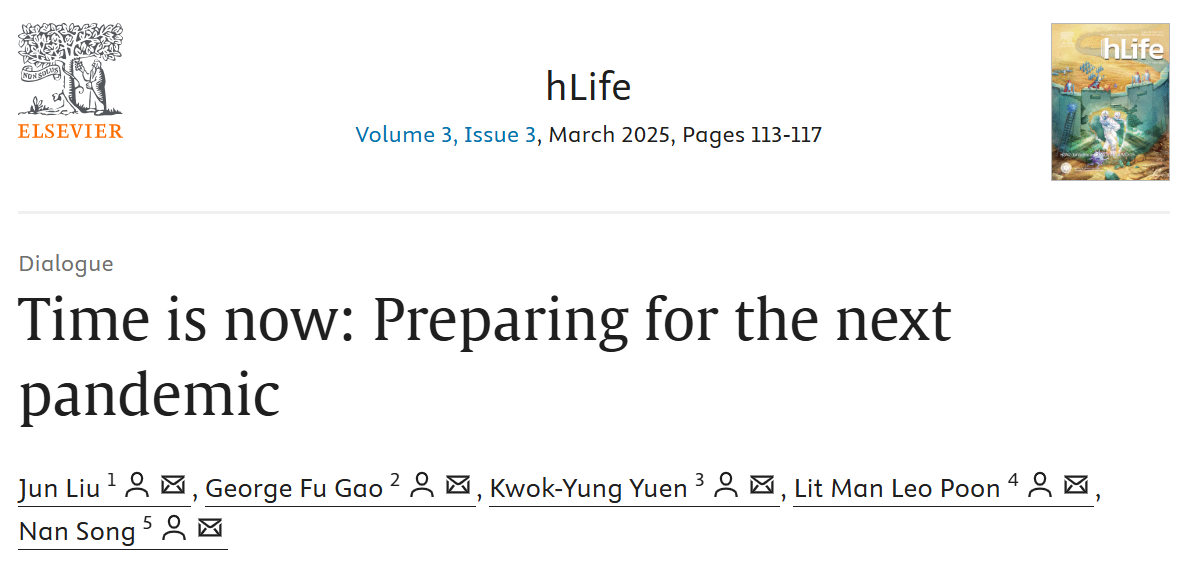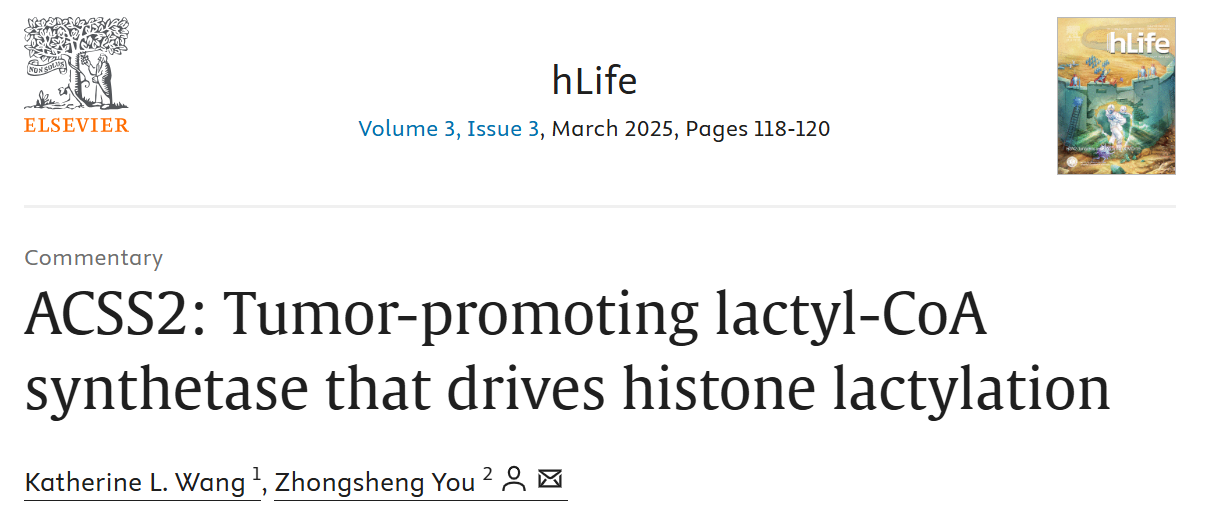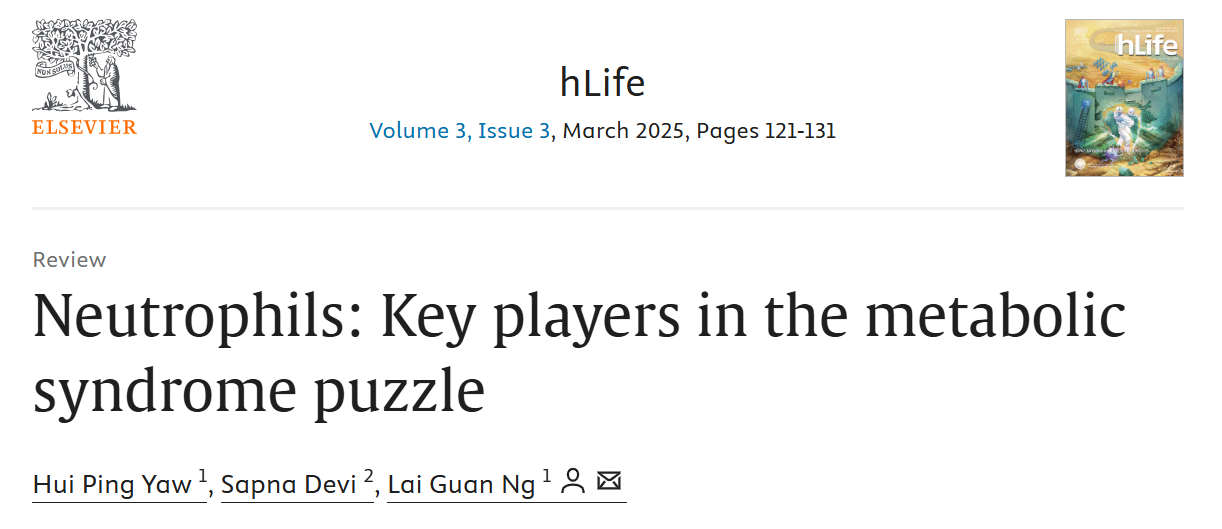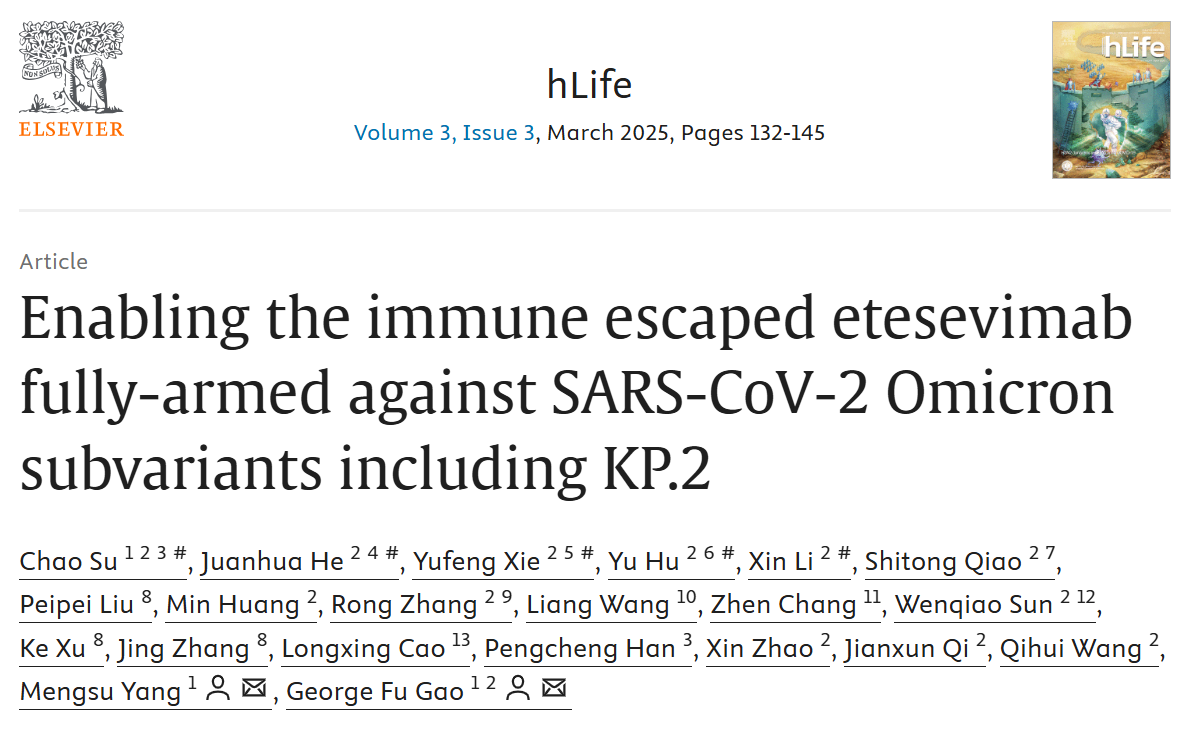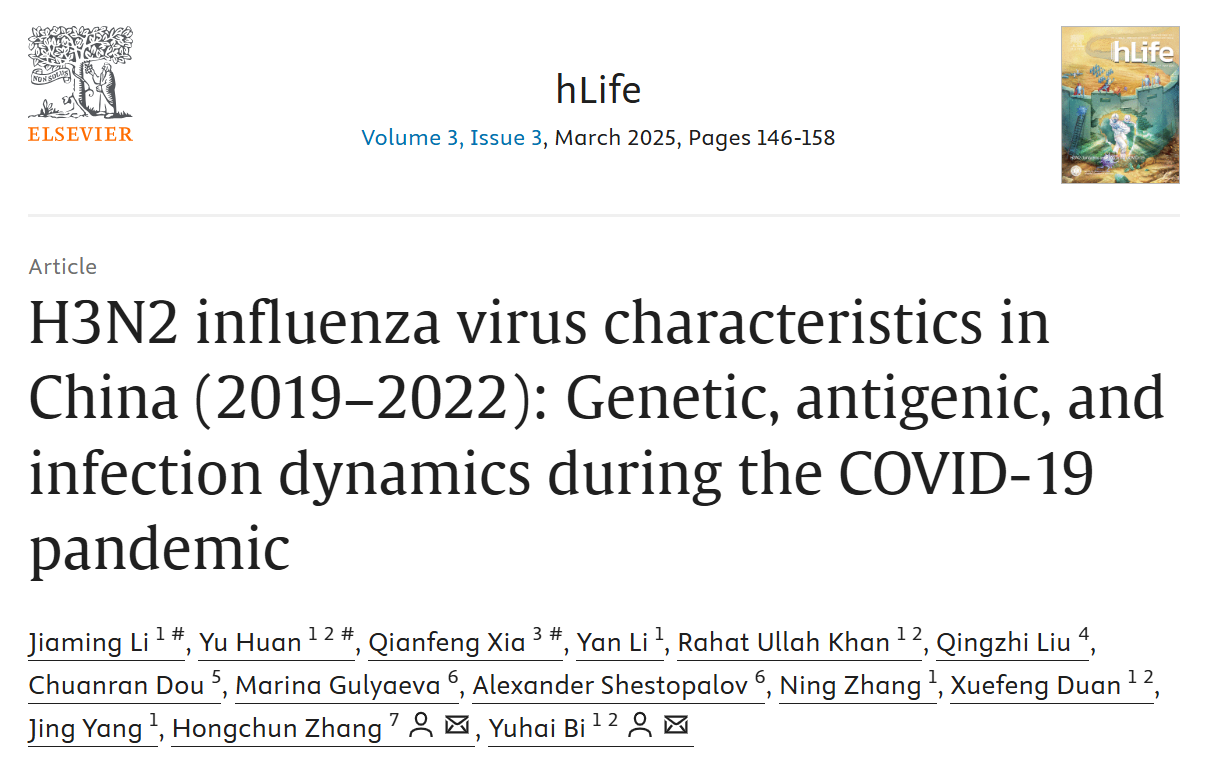博文
[转载]hLife 2025年第三期正式出版
||
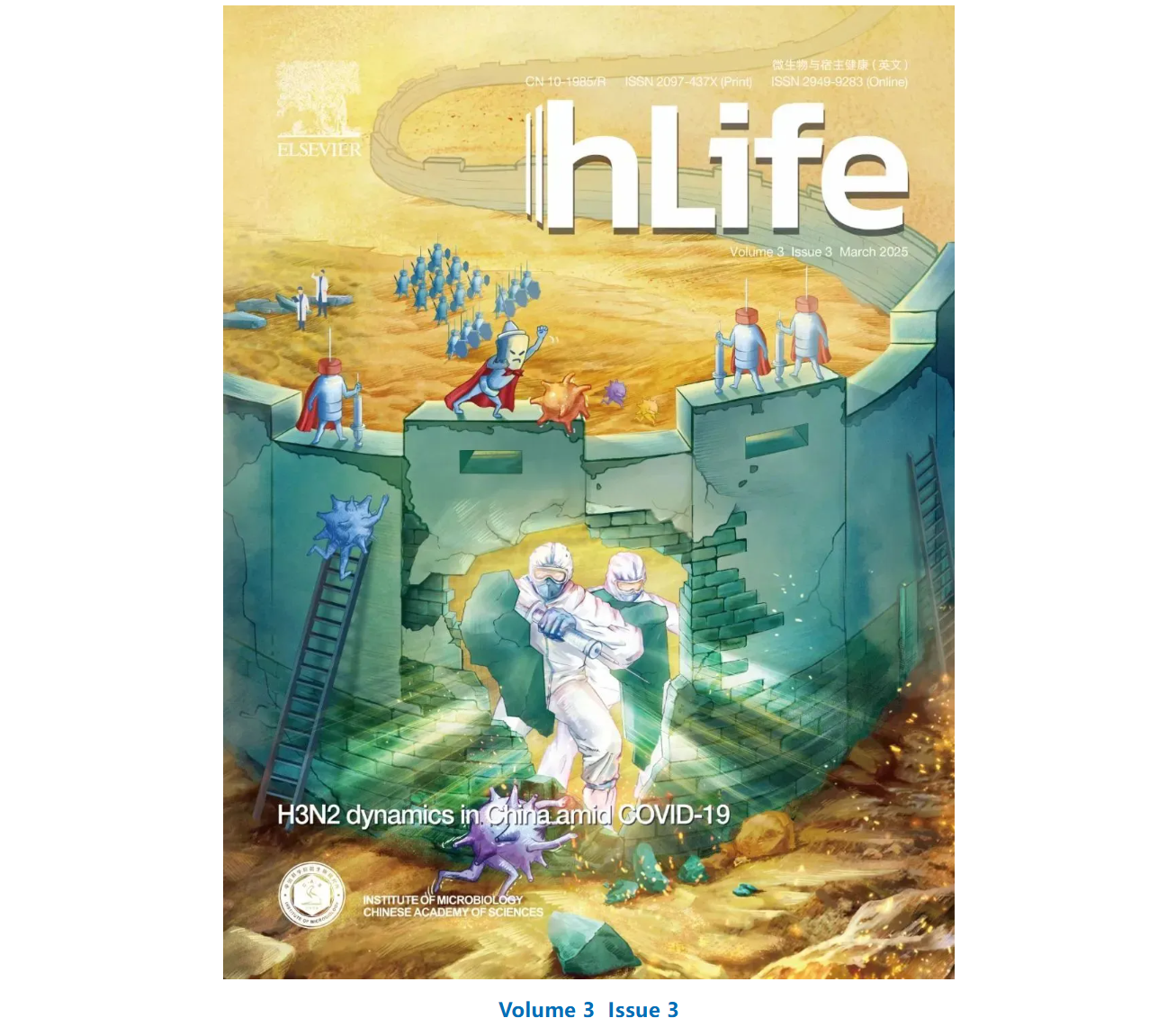
封面解读

Yuhai Bi
Seasonal influenza remains a serious threat to human health, causing 3–5 million severe cases and approximately 290,000 to 650,000 fatalities annually. In China, seasonal influenza activity significantly decreased during the COVID-19 pandemic, yet the H3N2 virus led to three epidemic waves between 2019 and 2022. Our study highlights that H3N2 viruses in different clades showed genetic reassortment, which accelerated the mutation of the viruses. Additionally, the mismatch between the H3N2 circulating viruses and the WHO-recommended vaccine strains may have contributed to the influenza outbreak. The epidemic strains replicated better at 37 ℃ compared to 33 ℃, which may explain the H3N2 outbreak in summer. These findings emphasize the necessity of strengthening surveillance systems and fostering global collaboration to optimize vaccine updates. Furthermore, developing novel or universal vaccines against influenza virus and even coronavirus is imperative to address antigenic variability and mitigate future pandemic risks.
All Papers
1. Time is now: Preparing for the next pandemic通讯作者:刘军、高福、袁国勇、潘烈文、宋楠
At the BIOHK2024, held on September 11–14, 2024, the roundtable discussion titled “Time is now: Preparing for the next pandemic,” brought together Professors Jun Liu, George Fu Gao, Kwok-Yung Yuen, Lit Man Leo Poon, and Nan Song. They discussed the recent emergence of viruses such as H5N1 in North America, where the first human case without animal contact was reported. And they explored the current state of global readiness for impending viral threats, focusing on the necessity for enhanced surveillance, improved diagnostic technologies, and the development of more efficient vaccines and drugs. Given these developments, the panel underscored the importance of a coordinated global response, the role of vaccination in mitigating pandemic impacts, and the challenges posed by emerging viruses and their variants.
引用:
Liu J, Gao GF, Yuen KY, et al. Time is now: Preparing for the next pandemic. hLife 2025; 3: 113–117.
2. ACSS2: Tumor-promoting lactyl-CoA synthetase that drives histone lactylation
通讯作者:尤忠胜
The specific enzymes that synthesize lactyl-CoA and catalyze protein lysine lactylation in mammalian cells remain a mystery. The role of protein lactylation in normal physiological conditions and pathological settings such as tumorigenesis also remains to be further explored. A recent groundbreaking study by Zhu et al. has started to unravel these mysteries. Zhu et al. identified acetyl-CoA synthetase 2 (ACSS2) as a bona fide lactyl-CoA synthetase that converts lactate to lactyl-CoA, which in turn serves as a substrate of the acetyltransferase/lactyltransferase KAT2A to directly lactylate histone H3. Interestingly, the activities of these enzymes play an important role in tumor growth and immune evasion in mouse models.引用:Wang KL, You Z. ACSS2: Tumor-promoting lactyl-CoA synthetase that drives histone lactylation. hLife 2025; 3: 118–120.3. Neutrophils: Key players in the metabolic syndrome puzzle
通讯作者:Lai Guan Ng
- Metabolic syndrome (MetS) links chronic inflammation in the adipose tissue to an increased risk of metabolic diseases.
- MetS-induced metabolic changes alter neutrophil metabolism, plasticity, and effector functions.
- Targeting neutrophils could offer new therapeutic opportunities for MetS-associated type 2 diabetes mellitus and cardiovascular diseases.
 引用:
引用:Yaw HP, Devi S, Ng LG. Neutrophils: Key players in the metabolic syndrome puzzle. hLife 2025; 3: 121–131.
4. Enabling the immune escaped etesevimab fully-armed against SARS-CoV-2 Omicron subvariants including KP.2通讯作者:杨梦苏、高福BAADesign was a novel strategy for broad-spectrum and affinity-mature antibody design.
CB6-IV restored binding affinity and neutralizing activity against multiple Omicron subvariants.
Mutations in complementarity-determining regions (CDR) 1 and CDR2 of CB6-IV improved the neutralizing potency of receptor-binding domain (RBD)-1 group antibodies.

引用:
Su C, He J, Xie Y, et al. Enabling the immune escaped etesevimab fully-armed against SARS-CoV-2 Omicron subvariants including KP.2. hLife 2025; 3: 132–145.
The H3N2 influenza viruses caused three known outbreaks in China during the spread of coronavirus disease 2019 (COVID-19), underscoring the associated public health risks.
The epidemic strains replicated well in vitro and in vivo without prior adaptation and replicated better at 37 °C compared to 33 °C, which may explain the H3N2 outbreak in summer.
The mismatches between the recommended vaccine strains and the epidemic H3N2 viruses were identified during the COVID-19 pandemic.
A personalized and precise vaccination update program needs to be added to the agenda after the COVID-19 pandemic.

引用:
Li J, Huan Y, Xia Q, et al. H3N2 influenzavirus characteristics in China (2019–2022): Genetic, antigenic, and infection dynamics during the COVID-19 pandemic. hLife 2025; 3: 146–158.
期刊简介
hLife由高福院士、董晨院士和Jules A. Hoffmann教授(2011诺奖获得者)领衔,是中国科学院微生物研究所主办,中国生物工程学会,浙江大学陈廷骅大健康学院,西湖大学医学院,上海市免疫治疗创新研究院和广州霍夫曼免疫研究所联合支持,与国际出版商爱思唯尔合作的健康科学领域综合性英文期刊。
hLife聚焦健康科学领域的前沿进展,旨在促进基础研究与临床应用的融合发展。期刊发表与医学相关各研究领域最新成果,学科领域包括(但不限于)病原生物学、流行病学、生理学、免疫学、结构生物学、疾病监测、肿瘤、药物、疫苗和健康政策等。
hLife是一本金色开放获取期刊,月刊出版;2022年成功入选“中国科技期刊卓越行动计划高起点新刊”;2023年11月正式创刊; 2024年5月被DOAJ收录;2024年8月被Scopus收录。
2026年前hLife接收的稿件免收文章处理费(APC)。
期刊网址:
https://www.sciencedirect.com/journ
https://wap.sciencenet.cn/blog-3552961-1481136.html
上一篇:[转载]hLife 虚拟专辑 | Pathogen & Immunity
下一篇:[转载]hLife | 中国科学院微生物所王硕团队利用人工智能赋能结直肠癌免疫治疗预测
